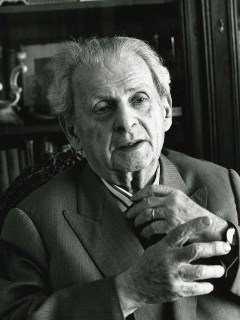
Publication details
Publisher: Springer
Place: Berlin
Year: 2009
Pages: 111-131
Series: Library of Ethics and Applied Philosophy
ISBN (Hardback): 9781402093463
Full citation:
, "Listening to the language of the other", in: Radical passivity, Berlin, Springer, 2009


Listening to the language of the other
pp. 111-131
in: Benda Hofmeyr (ed), Radical passivity, Berlin, Springer, 2009Abstract
In this chapter, Topolski explores the idea that Levinas did not, in fact, write in two separate "languages', one so-called confessional and the other so-called philosophical. Rather, it is her contention that Levinas communicated in a "language ' that he created as his thought developed, which she labels as "Judeosophy '. It is a language that allows for a dialogue between Jewish thought and Greek philosophy, that challenges the symbolic boundaries between Athens and Jerusalem as set forth (among others) by Leo Strauss. Judeosophy is the language of Jewish philosophy, the interaction of two modes of wisdom both of which are vital for Levinas's thought. It is more than a simple translation of "Greek' into "Hebrew' (or vice-versa); more than two parallel languages, one for Jews, the other for philosophers. Hence one cannot fully appreciate Levinas's genius unless one is willing to consider how he brings together ideas from Jewish thought and Greek philosophy. Practically, this requires that one read — and take seriously — both his so-called confessional and philosophical writings. After making the case for Judeosophy, Topolski begins by making the task easier for her philosophical readers by providing a brief introduction to the "language' of Jewish thought as it is used by Levinas. Next, she focuses on three "concepts' from Jewish thought, discussed at length in Levinas's Jewish writings and in the Talmudic readings, which play an important role in his so-called philosophical writings. These are the face, "here I am ', and God ; each of which, she claims, cannot be fully grasped without their Judeosophic roots. Furthermore, each of these allows us to enrich our understanding of the notion of radical passivity, proving the significance of the so-called confessional writings for the so-called philosophical writings.
Cited authors
Publication details
Publisher: Springer
Place: Berlin
Year: 2009
Pages: 111-131
Series: Library of Ethics and Applied Philosophy
ISBN (Hardback): 9781402093463
Full citation:
, "Listening to the language of the other", in: Radical passivity, Berlin, Springer, 2009

